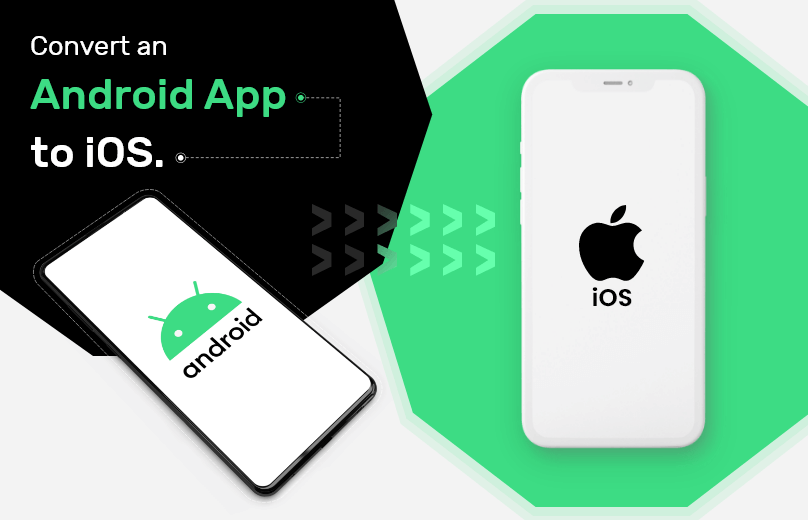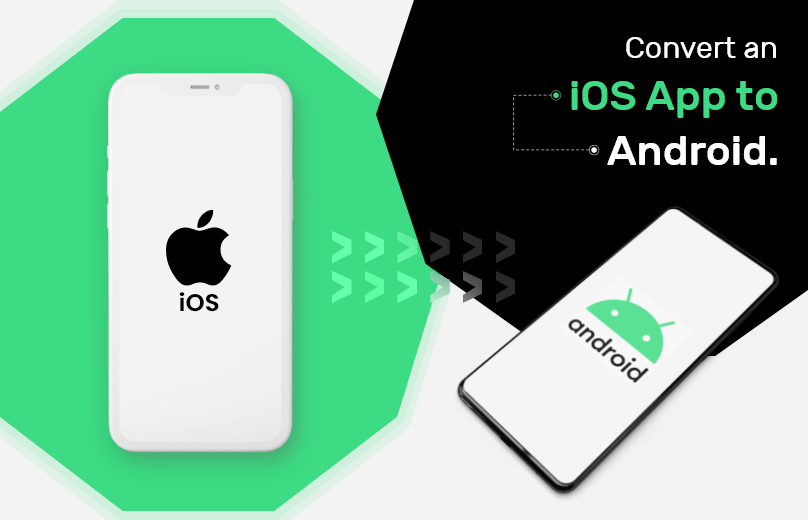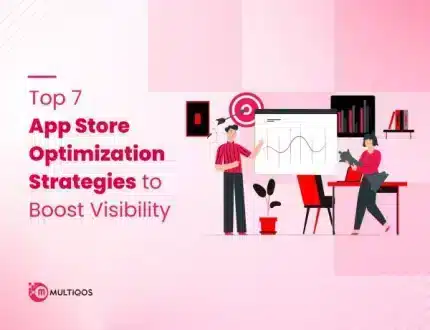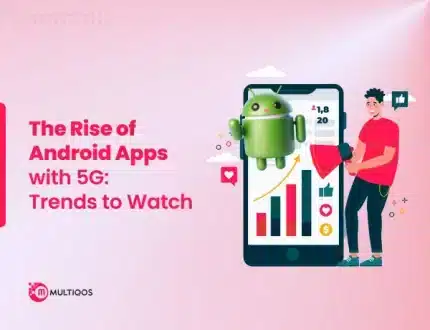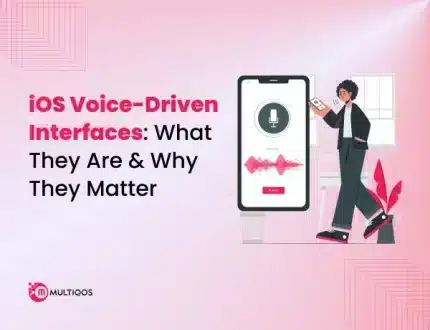How to Convert an Android App to an iOS App (and Vice Versa)
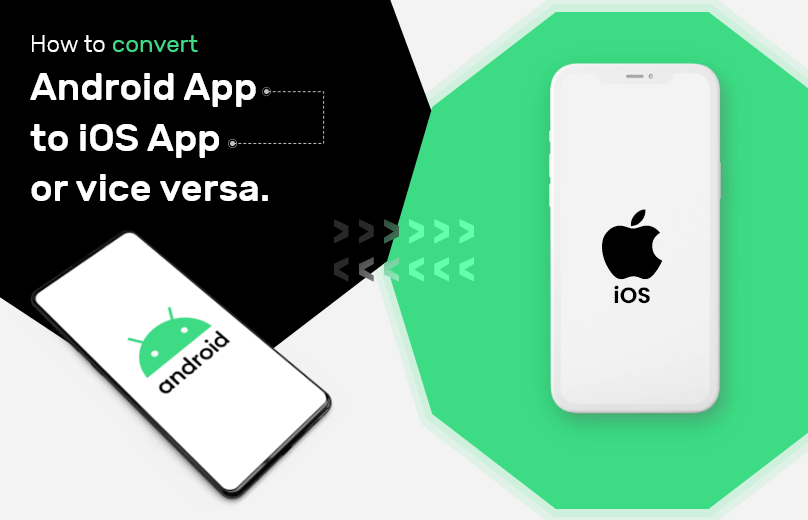
Table of Contents
- Android Vs. iOS Key Differences
- Reasons To Convert An Android App To iOS Or Vice Versa
- Top Things To Consider Before Porting An Android App To iOS
- Why Should You Port Android To iOS App For Your Business Growth?
- Challenges Of Converting Android To iOS App
- How Much Does It Cost To Port An Android App To iOS?
- Step-by-step Process: How To Convert An Android App To iOS Or Vice Versa
- How Much Does It Cost To Convert An Android App To An iOS App, Or The Other Way Around?
- How Can Multiqos Help In Porting Android Apps To iOS Or Vice Versa?
- Final Thoughts
Android Vs. iOS Key Differences
When developing a mobile application, selecting an OS might be confusing as both platforms have their pros and cons. Some key differences exist between Android and iOS platforms. For instance, a majority of smartphone users prefer Android over iOS. Similarly, there are many apps that later became available for the Android platform.
It is worth mentioning here that iOS-based devices can block third-party app stores. On the contrary, Android doesn’t have this feature. Nowadays, iOS app development is becoming popular because of the popularity of iOS-based apps. Android is an open-source model, whereas iOS is closed with open source components.
Reasons To Convert An Android App To iOS Or Vice Versa
The primary reason behind converting an Android app to iOS and vice-versa is to seize the market opportunity. In simple words, the reason to convert an app is to expand your market base. Converting an iOS app into Android and vice-versa also helps you to develop new markets. New and unexplored markets imply more users and shares.
Another reason for converting an Android app into iOS and vice-versa is to harness the new software capabilities. With the help of Android app development services, you would be able to add or remove features based on the preferences of your users.
There exists another reason why should convert an Android app into iOS and vice-versa. Boosting profits in the new market domain is one of the main objectives of marketers. By porting an app, they would be able to capture the attention of the newer type of audience.
App porting is also associated with entering an entire brand ecosystem. If you want your Android app to reach iOS users, then porting is the best way forward. In simple words, porting an app to a respective OS is all about capturing market potential and gaining exposure.
Top Things To Consider Before Porting An Android App To iOS (Reverse)
There are various things you should consider before converting an Android app into iOS and vice-versa. They are as follows:
Selection of a Proper Programming Language
As the fundamental Android app development language, Kotlin is usually recommended by Google. This is because it facilitates the smoothest and fastest rework of Android elements. Kotlin comes equipped with complete backward compatibility with Java. Moreover, you have to work with Swift, a programming language developed by Apple, to finalize the porting of the app.
Set the OS Versions Properly
When compared to the Android OS, all iPhone smartphones and devices rely on a single iOS. As soon as a new version is released, all the devices compatible with it are updated simultaneously. Hence, the best option is to opt for the stable iOS version for a smooth transition.
Prepare for the Redesign Project
While a specific part of the design can be reused, many minor and major elements usually undergo change. In simple words, you should outline the differences between flat and material design guidelines.
Why Should You Port Android To iOS App For Your Business Growth?
Advantages Of Converting For The Business Owner
No doubt, cross-platform mobile app development is gaining increasing popularity among a large number of masses. As stated earlier, the main benefit of converting an Android app into iOS and vice-versa is to capture new market territories. For instance, in a particular area, if people prefer iOS apps, then you cannot market your brand with an Android app.
Though you can go for separate iOS app development, it is much easier to port an app into iOS from Android. If you want to expand your customer base and develop new markets, opting for app porting is the best bet.
Converting an Android app into iOS and vice-versa ensures that you reinforce your brand’s objectives on a new group of the target audience. Apple devices are still a force to reckon with in many foreign nations like Canada, the USA, etc. If you want to seize sizable growth, then converting an Android app into iOS and vice-versa is quite ideal.
Challenges Of Converting Android To iOS App
To be precise, converting an Android app into iOS and vice-versa has its fair share of challenges. Here is the list of challenges which you would usually face while converting an Android app into iOS and vice-versa.
Difference in Architecture
The most annoying thing about Android is the existence of a large number of versions of the OS. New versions tend to come out every month. In other words, it is quite difficult to stay updated with the changes. Features available in one version may not be available in another version. To solve this issue, you need to draw a line between the newer and older versions of the OS.
Code, Libraries and Frameworks
To be precise, there are always some rules and frameworks for mobile app development. You have to assess the compatibility of these tools before transforming an Android app into an iOS app and vice-versa. If they are not compatible, you should recognize the proper alternatives. It would be great if both the platforms were based on Objective-C.
Testing
In the process of converting an Android app into iOS and vice-versa, another challenge is testing. The total number of tests you will need to run depends completely on the Android devices. And if you are familiar with testing Android apps, then at first, it might be a challenge to test iOS apps.
How Much Does It Cost To Port An Android App To iOS?
The cost of converting an Android app into iOS and vice-versa is dependent on a wide variety of factors. However, the final cost is something quite equal to the cost of developing an app from scratch. Here are some factors which determine the cost of converting an Android app into iOS and vice-versa.
- The complexity of the design architecture and the total number of assets involved
- Location and rates of the software developer
- All costs should be included, like project management, maintenance, etc.
- The addition of new features will also influence the cost of converting an Android app into iOS and vice-versa
That’s why it is advisable to contact a reputed mobile app developer who will help you to be aware of the costs of converting an app.
Step-by-Step Process: How To Convert An Android App To iOS Or Vice Versa
For converting an Android app into iOS and vice-versa, you have to follow a step-by-step guide. Here are the steps which you need to follow.
Assess the Business and Technical Requirements
In simple words, you should first analyze your objectives and see whether these goals align with app conversion. It would be best if you also analyzed the compatibility specifics with the iOS platform along with third-party modules.
Deploy a Design Overhaul
Numerous essential design elements of the existing Android application will need to be revised and changed in accordance with the Flat Design guidelines. The Android-native UI mirroring feature and prior design segmentation into assets are important features. The design for app porting should be a separate patch of project workflow.
Rephrase the Code and reset the Overall Architecture
Because the Android app code cannot be recompiled to fit the iOS architecture requirements, you will need to recode the majority of the software. The most important thing here is to keep all the compatibility and sync every step of the process with new platform requirements.
Extensive Quality Analysis with Testing
After converting an app from Android to iOS, you must thoroughly test all of the functional UI/UX features and other operational capabilities of the converted app during the finalisation stages. In addition, some additional Quality Assurance effort is required to ensure the app’s field use quality.
How Much Does It Cost To Convert An Android App To An iOS App, Or The Other Way Around?
Here are some of the factors which determine the cost of converting an Android app into iOS and vice-versa.
- The architecture’s complexity
- Design specifics associated with UI and UX
- The ways in which you can augment new features
- Specifics related to UI and UX
How Can MultiQoS Help In Porting Android Apps To iOS Or Vice Versa?
At MultiQoS, we are the experts of cross-platform mobile application development. Our developers can either help you convert or port an Android or iOS app. When the context is about mobile app development, we always follow a highly transparent process.
In other words, we keep our clients in the loop while facilitating important decisions. If you have a mobile app idea in your mind, contact us at the earliest. We will assist you in making your vision a reality.
Final Thoughts
So as you can see, there are various benefits associated with app conversion and porting. Contact a reliable mobile app developer and get the best out of your requirements. If you need assistance porting your app to one of the operating systems or have any questions, feel free to contact us. We’d be delighted to assist you!
Let’s Create Big Stories Together
Mobile is in our nerves. We don’t just build apps, we create brand. Choosing us will be your best decision.
Get In Touch

